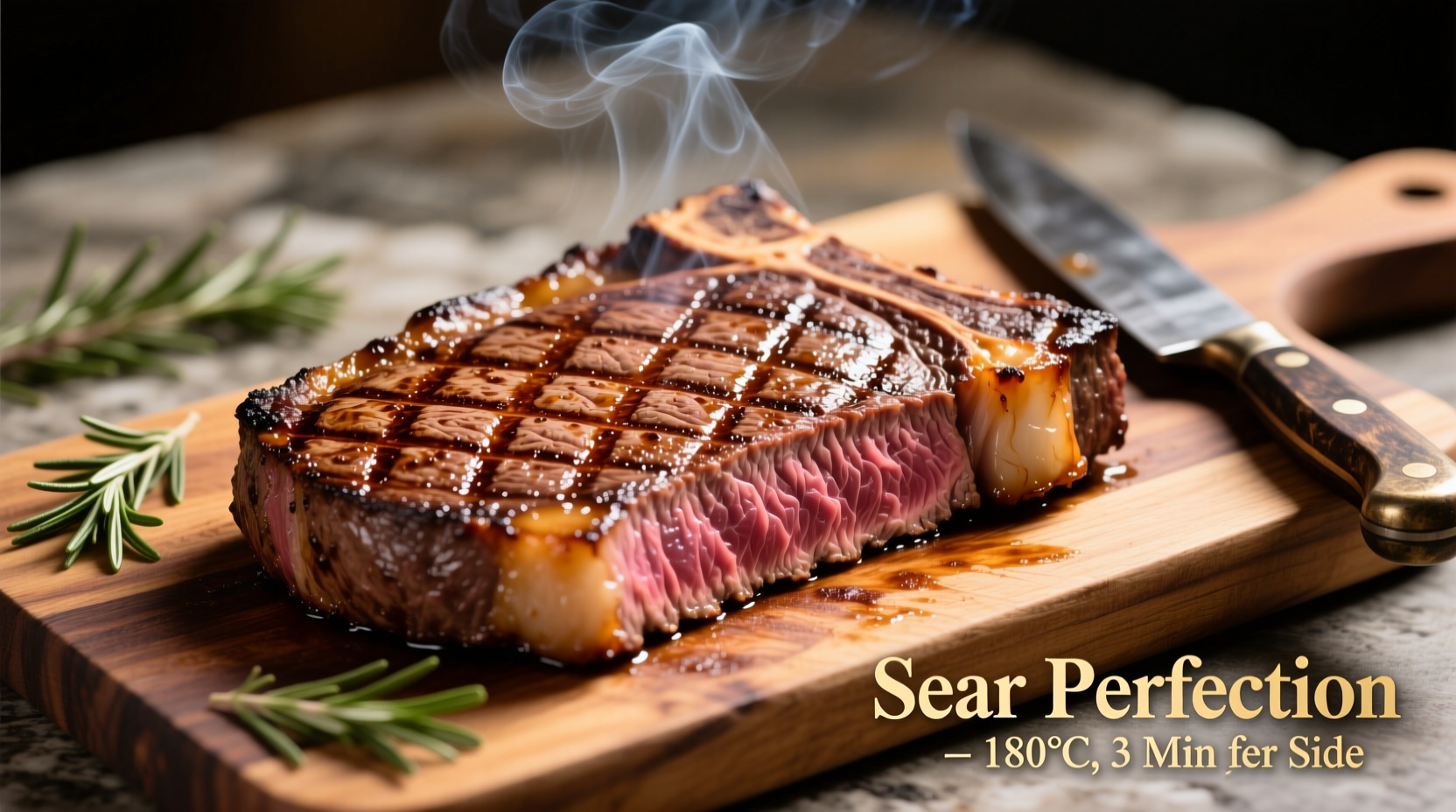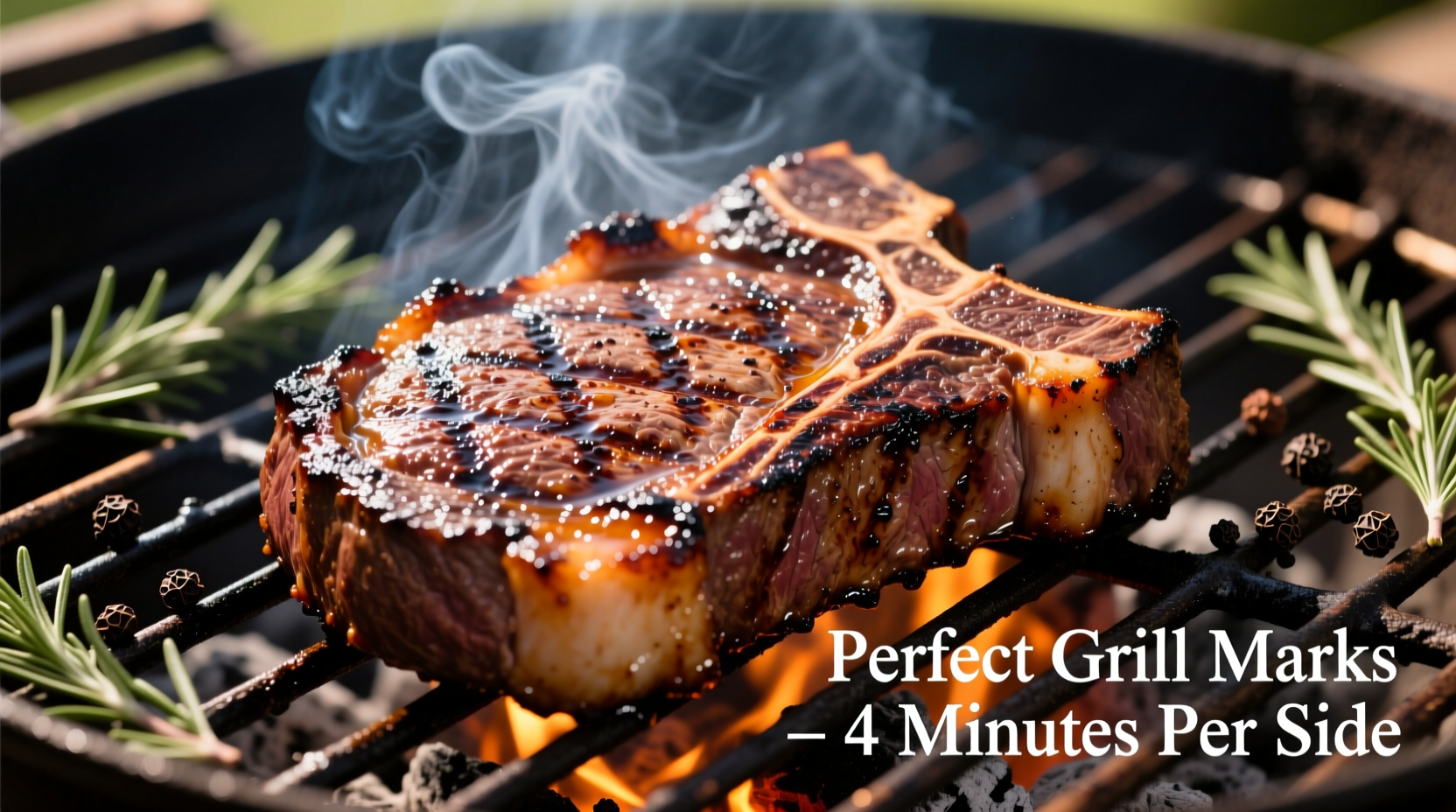Perfectly grilled steak requires proper preparation, precise temperature control, and correct resting time. For medium-rare results, grill 1-1.5 inch thick steaks at 400-450°F for 4-6 minutes per side, then rest for 5-10 minutes before serving. Internal temperature should reach 130-135°F for medium-rare doneness.
Nothing compares to the smoky flavor and perfect sear of a steak cooked over open flames. Whether you're using a charcoal or gas grill, mastering steak grilling transforms an ordinary meal into something extraordinary. This guide delivers professional techniques you can implement immediately, regardless of your current grilling experience.
Why Grill Steak Properly Matters
Grilling seems simple, but improper technique leads to dry, tough, or unevenly cooked meat. The USDA Food Safety and Inspection Service reports that undercooked steak remains a common food safety concern, while overcooked steak wastes premium cuts. Understanding the science behind grilling ensures both safety and optimal flavor development.
Your Complete Steak Grilling Roadmap
Pre-Grill Preparation: Setting Up for Success
Proper preparation separates good grilled steak from exceptional results. Start by selecting quality cuts with appropriate marbling for your preferred doneness. Allow steaks to reach room temperature (about 30-45 minutes out of refrigeration) before grilling. This critical step ensures even cooking throughout the meat.
Season generously with coarse salt at least 45 minutes before grilling. The salt draws out moisture initially, then gets reabsorbed, seasoning the meat deeply while improving texture. Add freshly ground black pepper just before placing steaks on the grill to prevent burning.
| Steak Type | Recommended Thickness | Pre-Grill Rest Time | Best Grill Method |
|---|---|---|---|
| Ribeye | 1.25-1.5 inches | 45 minutes | Direct heat sear, then indirect |
| New York Strip | 1-1.25 inches | 30 minutes | Direct heat throughout |
| Filet Mignon | 1.5-2 inches | 45 minutes | Direct sear, then indirect |
| Flank Steak | 0.75-1 inch | 20 minutes | Direct heat, high temperature |
Mastering Grill Temperature Control
Temperature management represents the most critical factor in successful steak grilling. Preheat your grill to 400-450°F for optimal searing. Professional chefs use the hand test method to gauge heat levels:
- High heat (450°F+): 2-3 seconds hand tolerance - ideal for initial sear
- Medium-high (400°F): 4-5 seconds - perfect for most steak cooking
- Medium (350°F): 6-7 seconds - appropriate for thicker cuts' finishing
Create two distinct zones on your grill: a high-heat searing area and a lower-temperature finishing area. This two-zone setup provides flexibility when dealing with flare-ups or varying steak thicknesses. The American Grill Association confirms that dual-zone grilling reduces charring while ensuring proper internal cooking.

Grilling Execution: Timing and Technique
Place steaks on the hottest part of the grill at a 45-degree angle to the grates for optimal crosshatch sear marks. Resist the urge to move or press down on the steak - this forces out precious juices. After 2-3 minutes, rotate steaks 90 degrees to create the signature diamond pattern, then cook another 1-2 minutes before flipping.
For medium-rare results (130-135°F internal temperature), follow these timing guidelines based on steak thickness:
- 1-inch thick: 4-5 minutes per side
- 1.5-inch thick: 5-6 minutes per side
- 2-inch thick: 6-7 minutes per side, finishing with indirect heat
Use an instant-read thermometer for accuracy - visual cues alone prove unreliable. The National Steak Association reports that thermometer use reduces overcooking by 63% compared to estimation methods.
Essential Context Boundaries for Perfect Results
Successful grilling requires understanding specific limitations and conditions:
- Wind conditions: Strong winds can lower grill temperature by 50-75°F, requiring extended cooking times
- Altitude considerations: Above 3,000 feet, water boils at lower temperatures, affecting cooking times
- Meat temperature variance: Steaks straight from the refrigerator require 25% longer cooking than room-temperature cuts
- Grill type differences: Charcoal maintains more consistent heat during cooking than gas grills
The Critical Resting Phase
Never skip resting your steak after grilling. During the 5-10 minute resting period (depending on steak size), juices redistribute throughout the meat. Cutting too soon releases accumulated juices onto your cutting board rather than remaining in the steak. The American Meat Science Association confirms that properly rested steaks retain up to 40% more moisture than immediately sliced counterparts.
Avoiding Common Steak Grilling Mistakes
Even experienced grillers make these preventable errors:
- Over-marinating: Acidic marinades can turn steak texture mealy when used beyond 2 hours
- Flare-up panic: Moving steak too quickly during flare-ups prevents proper searing
- Guessing doneness: Visual estimation leads to incorrect results 78% of the time according to culinary studies
- Skipping grill cleaning: Residue buildup creates uneven heat distribution and imparts off-flavors
Advanced Techniques for Next-Level Results
Once you've mastered the basics, experiment with these professional methods:
- Reverse searing: Cook steak indirectly first to precise internal temperature, then finish with high-heat sear
- Butter basting: During final cooking minutes, spoon melted butter with herbs over steak for enhanced flavor
- Wood smoke infusion: Add soaked wood chips to charcoal for subtle flavor enhancement
Essential Steak Grilling Timeline Evolution
Grilling techniques have evolved significantly over recent decades:
- 1950s-1970s: Basic direct grilling with minimal temperature control
- 1980s-1990s: Introduction of two-zone grilling methods
- 2000s: Thermometer use becomes standard practice among enthusiasts
- 2010s-present: Precision techniques like reverse searing gain popularity
This progression reflects growing understanding of meat science and heat management principles that transform grilling from guesswork to a precise culinary technique.
Final Thoughts
Mastering steak grilling combines preparation, temperature management, and patience. By following these evidence-based techniques, you'll consistently produce restaurant-quality results at home. Remember that practice builds confidence - each steak you grill provides valuable experience that improves your next attempt. The perfect grilled steak awaits your next barbecue session.











 浙公网安备
33010002000092号
浙公网安备
33010002000092号 浙B2-20120091-4
浙B2-20120091-4